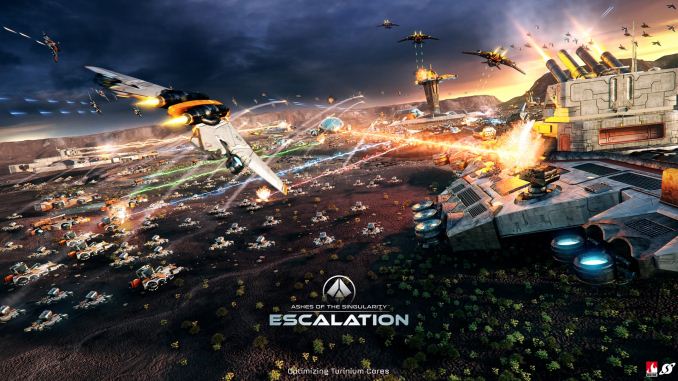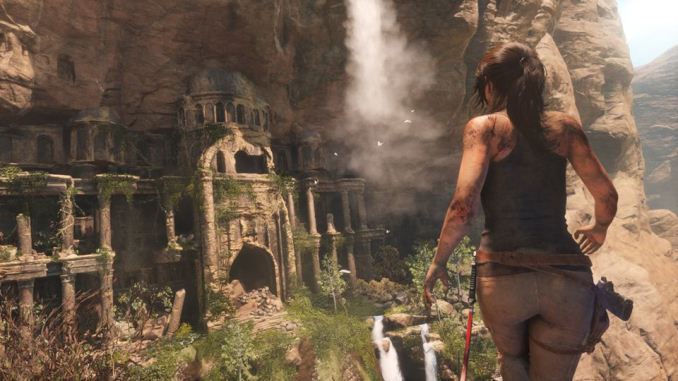The ASRock Z370 Taichi Motherboard Review: Competitive at $220, Aggressive at $190
by Joe Shields on July 20, 2018 1:15 PM ESTGaming Performance
AoTS Escalation
Ashes of the Singularity is a Real Time Strategy game developed by Oxide Games and Stardock Entertainment. The original AoTS was released back in March of 2016 while the standalone expansion pack, Escalation, was released in November of 2016 adding more structures, maps, and units. We use this specific benchmark as it relies on both a good GPU as well as on the CPU in order to get the most frames per second. This balance is able to better display any system differences in gaming as opposed to a more GPU heavy title where the CPU and system don't matter quite as much. We use the default "Crazy" in-game settings using the DX11 rendering path in both 1080p and 4K UHD resolutions. The benchmark is run four times and the results averaged then plugged into the graph.


Our AOTSe results here on the Z370 platform are just as close together as our results on the X299 platform. The results can tell us AOTSe can do all of its work with a 6c/12t processor without losing a step to the higher thread count CPUs. The Z370 Taichi managed 45.8 FPS in 1080p and 33.6 FPS in 4K. The results here are on the faster side of results but nothing out of the ordinary.
Rise of the Tomb Raider
Rise of the Tomb Raider is a third-person action-adventure game that features similar gameplay found in 2013's Tomb Raider. Players control Lara Croft through various environments, battling enemies, and completing puzzle platforming sections, while using improvised weapons and gadgets in order to progress through the story.
One of the unique aspects of this benchmark is that it’s actually the average of 3 sub-benchmarks that fly through different environments, which keeps the benchmark from being too weighted towards a GPU’s performance characteristics under any one scene.


Rise of the Tomb Raider results showed a marked improvement using the latest updated OS, microcode and ensuring the HPET timing is off. The Taichi ran at 100FPS in 1080p and 40.2 in 4K UHD. The 1080p result is over 7% faster than the next highest, while the 40.2 result is a bit less than 10% faster.












32 Comments
View All Comments
inighthawki - Friday, July 20, 2018 - link
Ah yes, a PS/2 port. I see their 2018 models are cutting edge. Please include a nice parallel port as well for my printer.stuffwhy - Friday, July 20, 2018 - link
While it's use cases are very very rare nowadays, I can see much more potential for someone to have an old favorite keyboard than desperately have to use an old parallel port printer or peripheral. Heck, anything requiring a parallel port probably wouldn't even have driver support in Windows 10.Gasaraki88 - Friday, July 20, 2018 - link
This comment shows how much you know about technology and cutting performance. Most new gaming motherboard have a PS/2 port for the mice. PS/2 gaming mice perform better than USB. Please keep up with the times.inighthawki - Friday, July 20, 2018 - link
By a negligible amount, unless maybe you have 10 USB devices plugged in stressing the entire bus all at the same time. You're talking about an absolutely negligible difference in latency and processing time for a gaming rig.GTVic - Friday, July 20, 2018 - link
It's not negligible to ASRock if the consumer purchases the competitor's motherboard because ASRock's board didn't have this feature.anon94582 - Sunday, July 22, 2018 - link
And it cost negligible to add while provides added service to consumers who use PS/2 mouse/keyboard.BoneHurtingJuice - Friday, July 20, 2018 - link
In my experience, PS/2 keyboard/mouse combo ports are finicky at best. I couldn't get my programmable cash register keyboard to be detected at all on these ports.Kraszmyl - Friday, July 20, 2018 - link
The ps2 port is for gamers and their keyboards. They are technically better than USB ones.DanNeely - Friday, July 20, 2018 - link
A number of newer USB gaming keyboards will use a high end keyboard driver model for n-key rollover instead of the baseline USB-1 implementation that only supported 5 keys, taking away the mash keys like crazy advantage that PS2 used to have.baka_toroi - Friday, July 20, 2018 - link
>instead of the baseline USB-1 implementation that only supported 5 keysFor fucks sake. I always thought it was a membrane keyboard thing, not a protocol-level thing.